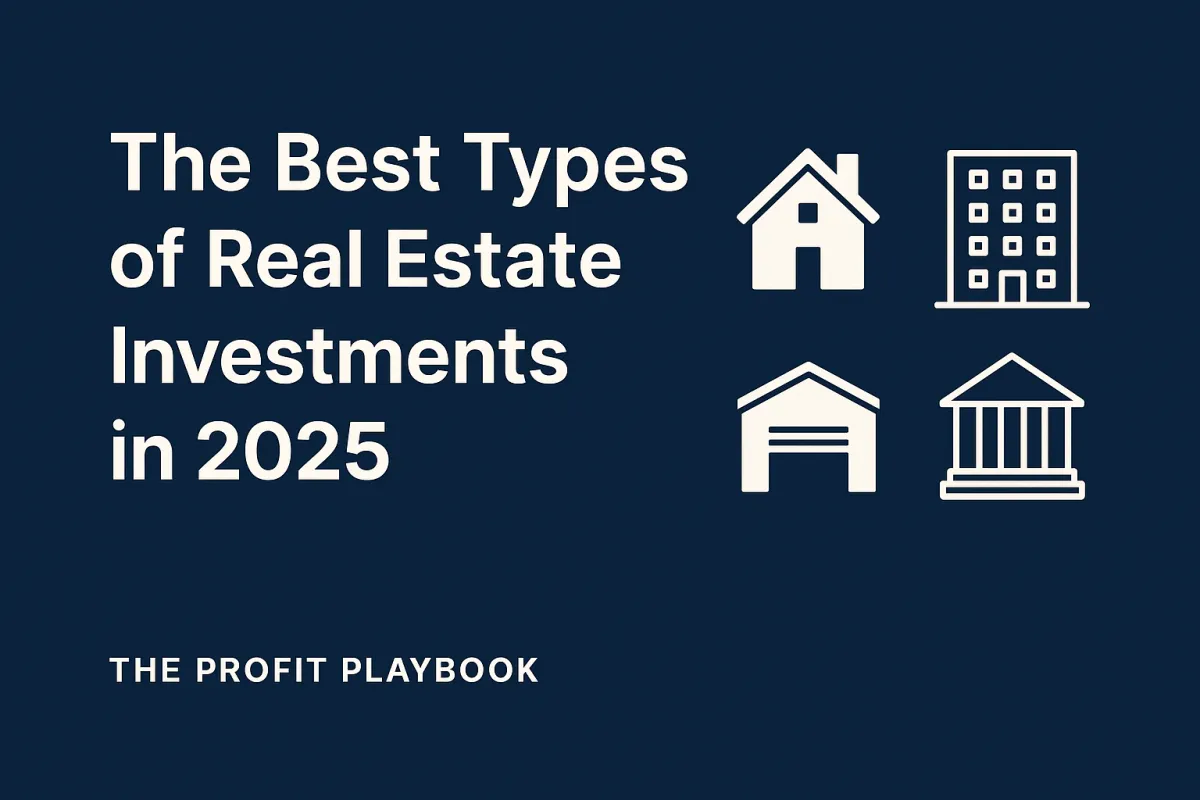
The Best Types of Real Estate Investments in 2025: A Strategic Guide from The Profit Playbook
The Best Types of Real Estate Investments in 2025
A Strategic Guide from The Profit Playbook
In 2025, real estate investing continues to evolve—driven by shifting market conditions, emerging technologies, and changing investor preferences. If you want to succeed in today's environment, it's not just about buying property—it's about choosing the right type of investment strategy that fits your goals.
Whether you're aiming for cash flow, appreciation, or passive income, here’s a breakdown of the top property types that real estate investors should be focusing on this year.
1. Residential Real Estate
Still the most popular choice among investors, residential properties include single-family homes, duplexes, small multifamily units, and vacation rentals.
Pros:
Consistent Demand – People always need a place to live.
Favorable Financing – Easier loan options and lower interest rates than commercial assets.
Tax Perks – Deductions like mortgage interest, depreciation, and repairs.
Cons:
Tenant Turnover – You may face frequent vacancies or costly maintenance.
Management Requirements – More hands-on or management fees if you outsource.
Best For:
Investors looking for stability, appreciation, or cash flow—especially those comfortable managing tenants or working with property managers.
2. Commercial Real Estate
This includes office buildings, retail space, strip malls, and medical or mixed-use buildings leased to businesses rather than individuals.
Pros:
Higher Rental Income – Businesses often sign multi-year leases at higher rates.
Professional Tenants – Companies typically maintain properties better.
Cons:
Economic Sensitivity – Vacancy risk increases during economic slowdowns.
More Complex Management – Lease terms, legal structures, and maintenance are more involved.
Best For:
Experienced investors ready to scale up and take on more complex, higher-reward projects.
3. Industrial Real Estate
Think distribution centers, warehouses, and storage facilities. Industrial is booming, especially with the continued rise of e-commerce.
Pros:
Strong Growth – Increased demand from logistics and supply chain businesses.
Long-Term Leases – These tenants typically commit for 5–10 years or longer.
Cons:
Location-Specific – Success depends on proximity to highways, airports, or population centers.
Niche Knowledge – You’ll need to understand industrial tenant needs.
Best For:
Investors looking to ride the e-commerce wave and earn steady long-term returns.
4. REITs (Real Estate Investment Trusts)
REITs let you invest in real estate passively through the stock market without ever owning physical property.
Pros:
Highly Liquid – Buy or sell shares easily.
Diversified Exposure – Invest in portfolios that span property types and locations.
Passive Income – Many REITs pay consistent dividends.
Cons:
Stock Market Volatility – Your investment can swing with market sentiment.
Lack of Control – You have no say in property-level decisions.
Best For:
Newer investors or those who want real estate exposure without owning or managing physical assets.
5. Crowdfunded Real Estate
Online platforms now let investors pool funds into large-scale real estate deals—like apartment complexes, hotels, or developments—with relatively low minimums.
Pros:
Lower Entry Point – Invest in deals for as little as $500–$5,000.
Access to Larger Deals – Participate in projects usually reserved for institutional investors.
Cons:
Illiquidity – Your capital may be locked in for years.
Platform Risk – Returns depend on both the project and the crowdfunding platform’s execution.
Best For:
Investors seeking diversification or access to deals they couldn’t fund alone.
Final Thoughts
The best type of real estate investment in 2025 depends on your goals, experience, and risk tolerance. Residential properties offer consistency and scalability. Commercial and industrial real estate can deliver higher returns but come with more complexity. And if you’re looking for a hands-off approach, REITs and crowdfunding platforms offer powerful entry points.
Whichever path you choose, align your strategy with your strengths—and never stop learning. That’s how we win in The Profit Playbook.

